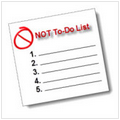What you don't do determines what you can do.

Tim Ferriss, author of the cult hit and international best-seller "The 4-Hour Workweek", makes that observation in a podcast last month. I completely agree. In my 2009 post on Prioritization, I note:
Prioritization is as much about what we choose not to do as what we don't In most organizations, priority is given to projects with the most political capital or those that are the furthest behind schedule, rather than to projects with the highest impact.
Even though research has shown creating a to-do list will make you more effective, Ferriss argues that "not-to-do" lists can be an even better method for improving performance. Here are the 9 habits he suggests we eliminate to free up time for more important activities:
- Do not answer phone calls from people you don't know
- Do not e-mail first thing in the morning or last thing at night
- Do not agree to meetings or calls with no clear agenda or end time
- Do not let people ramble: "Small talk takes up big time."
- Do not check email constantly
- Do not over-communicate with low profit, high maintenance customer
- Do not work more to fix being too busy
- Do not carry a cellphone or Crackberry 24/7
- Do not expect work to fill a void that non-work relationships and activities should
No matter how much time you invest, there's always more to do. As far back as 1955, Parkinson noted in The Economist that work expands to the amount of time you give it. Or as Warren Buffet has said:
The difference between successful people and really successful people is that really successful people say no to almost everything.
Prioritize so you can spend less time on work and yet accomplish more things that are important.
This blog also appeared on Manage by Walking Around on July 13, 2014.
Please follow me on Twitter, LinkedIn, and Google+.
